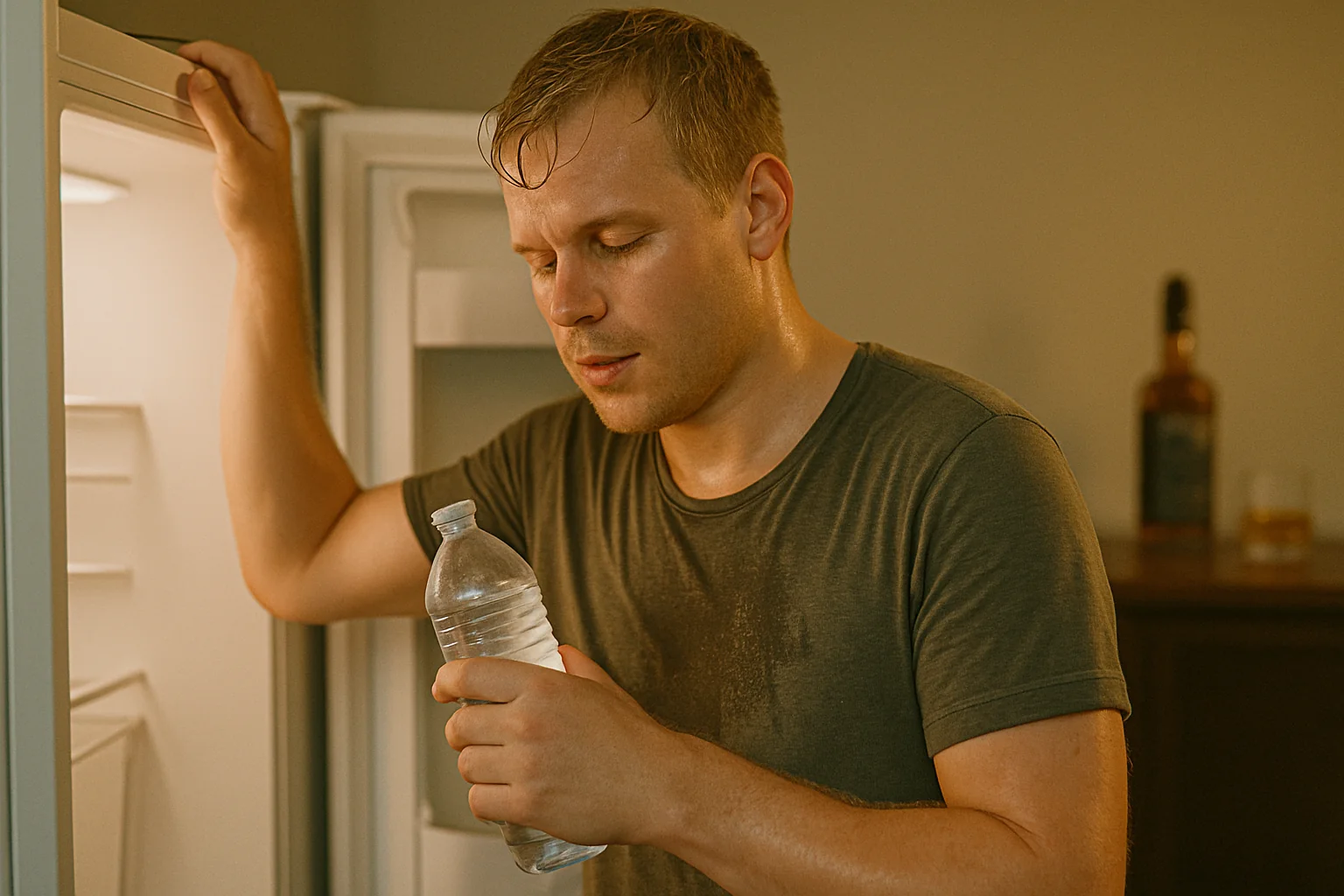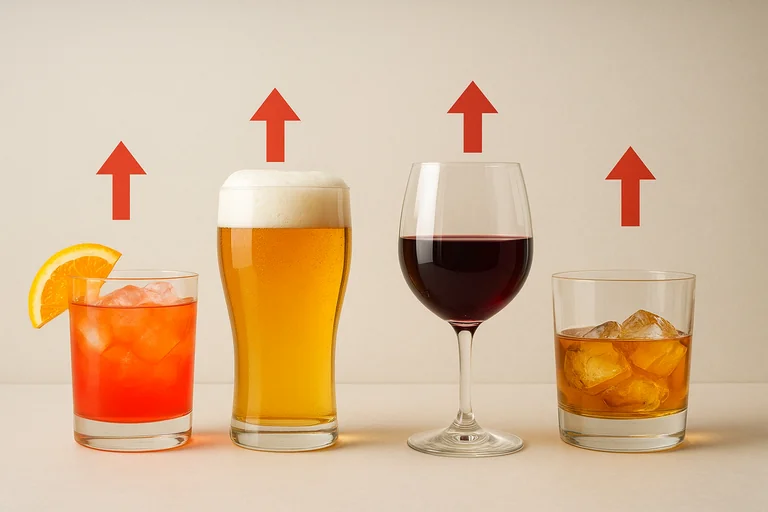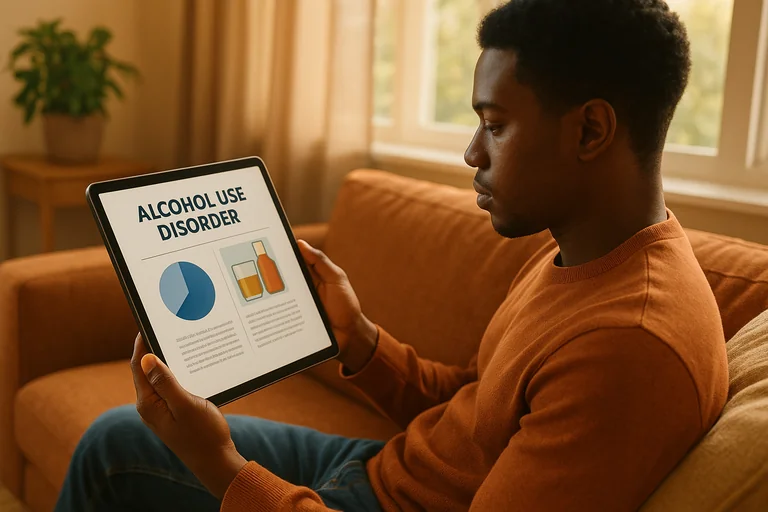A 2 minute assessment to get a personalized mental health or alcohol recovery plan.
It's a miserable, all-too-familiar feeling. You wake up in the middle of the night, your sheets are soaked, your heart is pounding, and you're shivering despite the sweat. It's not the flu; it's alcohol sweats, and they're more than just an uncomfortable nuisance—they're a warning sign from your body.
What You'll Discover:
- What to do when you experience alcohol sweats and night sweats
- Steps to take to determine if your symptoms require immediate medical attention
- The importance of understanding the connection between alcohol withdrawal and sweating
The idea of sweating after drinking may be concerning to some people, but it's actually been a documented medical symptom for decades. When traditional "just deal with it" approaches fail repeatedly, causing widespread discomfort and sleep disruption, many people assume it's just a normal hangover symptom. With modern understanding of alcohol withdrawal syndrome, medical interventions and other treatment options now available, it's actually very straightforward to understand what's happening to your body and how to address it effectively.
So, how do alcohol sweats work exactly? It's actually much more serious than you think with your nervous system directly involved.
Do Your Research About Alcohol Withdrawal Symptoms
Before you begin taking steps to address alcohol sweats, it's important to learn about alcohol withdrawal and its various symptoms. In particular you want to look up information on:
- How alcohol affects your nervous system and body temperature regulation
- What chronic alcohol consumption does to your brain and body
- When sweating and other withdrawal symptoms require emergency medical care
Medical conditions are triggered by different factors, and alcohol withdrawal sweats are the perfect example. It's not just for people with severe alcohol use disorder who drink large amounts daily. It's also appropriate for people who want to understand why even regular drinking can sometimes cause withdrawal symptoms when they stop.
No matter what your drinking pattern, it's always best to know as much as you can about withdrawal symptoms before experiencing them yourself.
Choose to Get Medical Assessment
The next part takes medical evaluation as well. You'll need to determine whether your alcohol sweats are mild withdrawal symptoms you can manage at home or signs of a serious medical condition requiring immediate attention. This is an extremely important decision that goes well beyond just hoping the symptoms will go away on their own.
You'll want to make sure that you understand the warning signs of dangerous withdrawal complications to ensure you get appropriate medical care when needed. Experience with alcohol withdrawal is also extremely important. Healthcare providers who have been treating withdrawal symptoms for years and specialize in addiction medicine are going to be well-equipped to help with proper assessment and treatment.
Take an Assessment of Your Withdrawal Symptoms
The medical provider you choose should evaluate your specific symptoms to determine the severity of your alcohol withdrawal. This is a crucial part of the process for understanding whether you need immediate medical intervention or can safely manage symptoms with outpatient care.
This assessment is a simple yet crucial part of the process for determining what level of care will be most appropriate for your situation. It also provides healthcare providers with baseline information that will be important in subsequent steps of the treatment process.
Choose the Right Level of Care
If alcohol withdrawal is confirmed after your assessment you can discuss treatment options and develop a plan with your healthcare provider. With evidence-based medical approaches there are several proven methods that all include different strategies for safely managing withdrawal symptoms as well as ongoing support for recovery.
Have Your Medical Consultation
The most essential step in addressing alcohol sweats is having a thorough evaluation with a healthcare provider who understands alcohol withdrawal syndrome. They will:
- Go over your drinking history and recent consumption patterns
- Discuss your withdrawal symptoms and when they started
- Listen to your concerns about your health and safety
This will help the provider determine what level of medical supervision you need and whether your symptoms require immediate intervention. If so, the healthcare provider will go over your treatment options and provide information on safely managing withdrawal.
Begin Following Medical Recommendations
After your medical consultation, you'll start implementing the withdrawal management plan your healthcare provider recommends. This might include medications to ease symptoms, hydration protocols, or inpatient monitoring depending on your specific situation.
The treatment will focus on keeping you safe and comfortable while your body adjusts to functioning without alcohol. It's extremely important to follow medical advice exactly as prescribed, especially when it comes to medication timing and dosing.
Take the Recovery Process Seriously
Once you understand what's causing your alcohol sweats you can begin taking the necessary steps to address the underlying alcohol dependence. There will be specific recommendations about continuing treatment, lifestyle changes, and ongoing support to prevent future withdrawal episodes.
It's extremely important to follow through with the complete treatment plan exactly as your healthcare provider recommends, particularly when it comes to addressing the root cause of your withdrawal symptoms.
Follow-Up to Prevent Future Episodes
Having ongoing follow-up appointments with your healthcare provider is highly beneficial in ensuring you don't experience dangerous withdrawal symptoms again. It gives you the opportunity to discuss your recovery progress and for your treatment plan to be adjusted, if needed.
The provider can also help you develop strategies for maintaining sobriety and accessing ongoing support resources for long-term recovery.
Why Your Body Works Against You When You Stop Drinking
Don't let outdated ideas about alcohol withdrawal being "just discomfort" fool you into thinking that sweating after stopping drinking is harmless or something you should tough out alone. The criteria for what makes alcohol withdrawal potentially dangerous is clear based on extensive medical research.
Many emergency physicians, addiction specialists and withdrawal experts will tell you that alcohol withdrawal affects your nervous system in profound ways. Even moderate drinkers can experience significant withdrawal symptoms, and it's particularly concerning because chronic alcohol consumption creates physical dependence that makes your body react dramatically when alcohol is removed.
Now that you have a better idea of what's happening in your nervous system when you stop drinking, let's delve further into the specific mechanisms behind alcohol sweats and when you should be most concerned.
The Undeniable Truth About Alcohol Withdrawal and Sweating
The undeniable truth is that alcohol withdrawal affects multiple body systems, and sweating is one of the most common and recognizable symptoms. According to Medical News Today, nervous system over-stimulation can cause your heart rate to quicken and blood vessels in your skin to widen, triggering excessive sweating.
Your Nervous System in Overdrive
Alcohol is a depressant that slows down your central nervous system. Your brain compensates by increasing activity of excitatory neurotransmitters to maintain balance. When you stop drinking, alcohol's depressive effects wear off but your brain remains in this over-stimulated state.
This "fight or flight" response triggers many withdrawal symptoms, including profuse sweating. Your nervous system is essentially stuck in high gear, causing your body to react as if you're in danger even when you're lying in bed trying to sleep.
Classic Withdrawal Syndrome Symptoms
According to the Cleveland Clinic, alcohol withdrawal is incredibly common, affecting about 50% of people with an alcohol use disorder. Excessive sweating typically appears within 6 to 24 hours after your last drink and is often accompanied by:
- Anxiety and extreme irritability
- Severe headaches and body aches
- Insomnia and disturbing nightmares
- Shaking and uncontrollable tremors
- Nausea and vomiting
- Heart palpitations and rapid pulse
These symptoms aren't just uncomfortable - they can indicate a serious medical condition that requires professional intervention.
Temperature Regulation Problems
When alcohol withdrawal affects your nervous system, it disrupts your body's ability to regulate temperature properly. Your internal thermostat essentially malfunctions, causing you to sweat profusely even when you feel cold or are in a cool environment.
This temperature dysregulation can make you feel like you have the flu, with alternating chills and sweats that make it impossible to get comfortable or sleep properly.
NEED TO KNOW: Alcohol withdrawal sweats are not the same as "sweating out" alcohol from your system. They're a neurological response to your brain's chemical imbalance when alcohol is removed.
When Sweating Becomes a Medical Emergency
What's most concerning about alcohol withdrawal sweats is when they signal the development of delirium tremens (DTs), the most severe and potentially fatal form of alcohol withdrawal.
DTs typically appear 48 to 96 hours after your last drink and represent a medical emergency requiring immediate hospitalization. Warning signs include:
- Severe confusion and complete disorientation
- Extreme agitation and uncontrollable restlessness
- High fever combined with profuse sweating
- Visual or auditory hallucinations
- Seizures or convulsions
- Dangerously rapid heart rate and extremely high blood pressure
The mortality rate for untreated delirium tremens can be as high as 35%, but with proper medical care it drops to less than 5%. If you or someone you know experiences any of these symptoms, call 911 immediately. Do not attempt to manage these symptoms at home.
Alcohol Intolerance vs. Withdrawal Sweating
For some people, sweating after drinking isn't withdrawal but alcohol intolerance - a genetic condition where your body lacks enzymes to properly process alcohol. This causes immediate reactions including:
- Facial flushing and redness
- Excessive sweating during or right after drinking
- Nausea and stomach upset
- Stuffy nose and breathing difficulties
- Rapid heartbeat
If you've always experienced these symptoms even with small amounts of alcohol, you likely have alcohol intolerance rather than withdrawal. While not the same as withdrawal, it's still a clear sign that alcohol isn't compatible with your body.
Managing Mild Withdrawal Sweats at Home
If your healthcare provider determines your withdrawal symptoms are mild and you can safely manage them at home, there are several strategies to help you feel more comfortable:
Stay Hydrated
Sweating causes significant fluid and electrolyte loss. Replenish with water, clear broths, or electrolyte drinks throughout the day. Avoid caffeine and sugary drinks that can worsen anxiety and dehydration.
Control Your Environment
Create a cool, comfortable environment to help regulate body temperature:
- Keep your bedroom temperature low, especially at night
- Use fans to circulate air and create cooling breezes
- Wear loose, breathable clothing made from natural fibers
- Use lightweight, breathable bedding you can easily adjust
Practice Good Hygiene
Shower regularly with cool or lukewarm water to lower body temperature and remove salt and sweat that can irritate your skin. This can help you feel more refreshed and comfortable.
Support Your Body's Recovery
Eat small, frequent meals rich in vitamins and minerals to support your body through withdrawal. Focus on complex carbohydrates, lean proteins, and healthy fats to stabilize blood sugar and support recovery.
Use Relaxation Techniques
Anxiety worsens withdrawal symptoms. Try deep breathing exercises, guided meditation, or gentle stretching to help calm your nervous system and reduce the intensity of symptoms.
While these strategies provide temporary relief, they're not substitutes for medical care when symptoms are severe or worsening.
The Long-Term Solution: Addressing Alcohol Dependence
Managing alcohol sweats is just treating the symptom. To stop them permanently, you need to address the underlying alcohol dependence that's causing withdrawal in the first place.
Professional treatment provides the safest and most effective path forward. Trying to quit "cold turkey" can be dangerous, especially for heavy drinkers. Medically supervised detox ensures your safety while your body adjusts to functioning without alcohol.
After detox, comprehensive treatment helps you build the skills and support system needed for long-term recovery:
- Therapy and counseling: Individual and group therapy help you understand the reasons behind your drinking and develop healthier coping mechanisms
- Medication-assisted treatment: Medications like naltrexone can dramatically reduce alcohol cravings and prevent relapse by blocking alcohol's euphoric effects
- Support groups: Connecting with others who understand your experience provides powerful encouragement and accountability
You Don't Have to Suffer Through This Alone
Waking up drenched in sweat is a distressing experience that can leave you feeling isolated and hopeless. Many people try to tough it out alone, but alcohol withdrawal can be dangerous and doesn't have to be endured without help.
Those night sweats are your body's clear signal that your relationship with alcohol has become physically dependent and is affecting your health in serious ways. They're not a sign of personal weakness - they're a medical symptom that deserves proper attention and treatment.
Taking the first step toward recovery can feel overwhelming, but it's also empowering. It's choosing to prioritize your health, sleep, and overall well-being over continued suffering.
A confidential online assessment can be a simple, pressure-free way to explore your options and see if treatment approaches like naltrexone might help you break free from the cycle of dependence that's causing these withdrawal symptoms.
Ready to learn more about your options? Take our Alcohol Use Assessment to get started.




